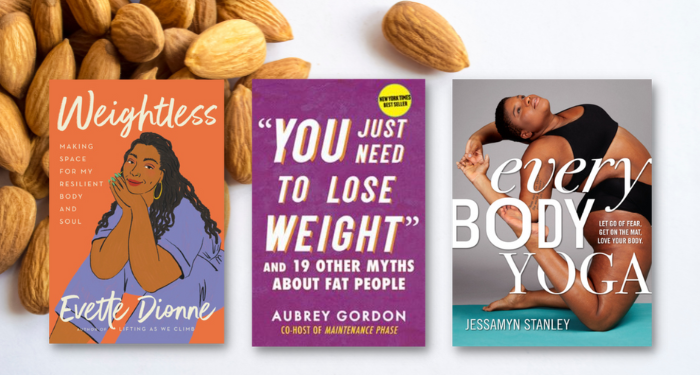
What Is an Almond Mom? 8 Books To Help Heal Your Relationship With Your Body
The Almond Mom hashtag and discussion is blowing up on social media, and we need to talk about it. If you’ve never heard the term Almond Mom, it’s a person who maybe, instead of helping you find a snack when you’re hungry instead says, “Are you sure? Maybe you should just drink water.” They’re the person who gives you a handful of almonds for lunch and nothing else, no matter how hungry you are. They ask how you’re going to work off the calories for the carbs you’re eating. They might suggest a cleanse, or a “quick fix” fad diet to “drop the belly fat.”
This is incredibly harmful behavior, both physically and emotionally for the person on the receiving end of Almond Mom’s comments. If you’re struggling to recover from a current situation with an Almond Mom or one you grew up with many years ago, dismantling those internal dialogues you’ve heard over and over can take months, if not years. While some resources are becoming more mainstream, like the podcast Maintenance Phase, which breaks down diet culture myths and history behind them, and Nutrition Tea, a nutritionist who uses her platform to encourage others to stop dieting and restricting and offers realistic and healthy lifestyle advice, other resources may be more difficult to find.
Getting started can be tricky, but if you’re looking for resources on how to learn about and tear down internalized or externalized fatphobia, are looking for body-positive resources, or wanting to hand materials to the Almond Mom in your life, here are eight books to start with.
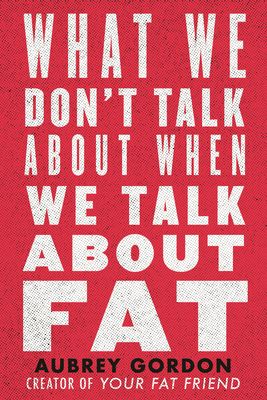
What We Don’t Talk about When We Talk about Fat by Aubrey Gordon
Aubrey Gordon, cohost of the aforementioned podcast Maintenance Phase, breaks down exactly what anti-fatness is and how we as a society can dismantle it and fatphobia. Because it’s not just about being fat: it’s about being denied medical care, being discriminated against for body size, being told fat people are worth less as a person than their thin friends. It’s not just about body positivity, and Gordon lays it all on the line when discussing the real change that needs to happen for social justice for fat people.
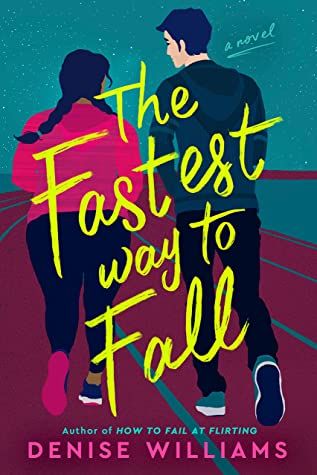
The Fastest Way to Fall by Denise Williams
If you’d rather start with fiction instead of jumping into the harder-hitting nonfiction, I highly recommend this romance novel that is both fun and packs a serious punch when it comes to more serious issues like eating disorders and fatphobia, both in person and online. It follows Britta, a journalist who is assigned to review a new fitness app and hits it off with her incredibly well-trained (and cute) coach, who encourages her to exercise at her own pace, eat healthy while still letting herself indulge, and sticks to her request to not lose weight. The fact that Britta, as a fat woman, does not want to lose weight, but rather simply become strong and fit, is revolutionary to many characters in the story, though it shouldn’t be. She also still encounters personal challenges along the way, learning what she does and does not want and how to love herself exactly as she is.
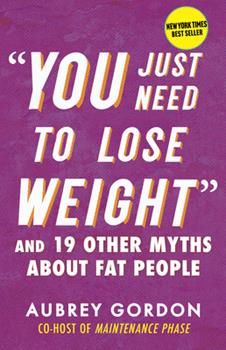
“You Just Need to Lose Weight”: And 19 Other Myths about Fat People by Aubrey Gordon
Yes, I am listing both of Gordon’s books on here, and for good reason. She is an incredible writer, and this book deviates from her other one in many ways and introduces new topics, all revolving around myths society at large believes about fat people and why they are wrong. From “it’s as easy as calories in, calories out” to “body positivity glorifies obesity,” she brings up each phrase fat and thin people alike hear over and over — and then tears each one down with exacting research to back it up by science.
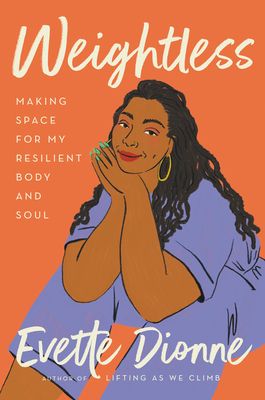
Weightless: Making Space for My Resilient Body and Soul by Evette Dionne
Dionne’s memoir about her own experiences as a fat Black woman illuminate many experiences fat Black women face daily but other groups of people may never see. She discusses her past, where she faced harassment and commentary, her heart failure diagnosis in her twenties, seeing women who looked like her on TV as comedic relief while being fetishized online. And every trip to the doctor’s office, no matter what it was for — a cold, a sinus infection, stomach pain — she was told to first lose weight, then they could tackle the other problem. Dionne challenges readers to break down our own internalized fatphobia to make the world we live in more accessible and safe for all people, no matter their body size.
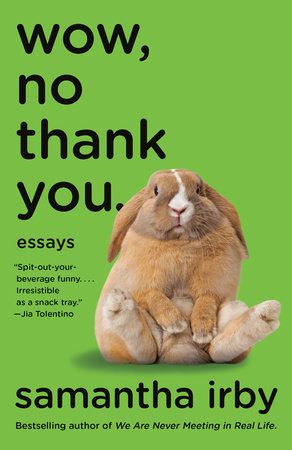
Wow, No Thank You by Samantha Irby
In addition to being a hilarious writer, Irby’s book of essays details what it was like to grow up fat and to exist as a fat adult in today’s society, in addition to also having degenerative arthritis and Crohn’s disease. She discusses how difficult it is to navigate places like airplanes — what if she has to go to the bathroom? Should she not eat for several days before flying to avoid having to use the bathroom? Her discussions bring up important points about the world making space for all bodies, including people who have chronic illnesses or disabilities. Disability Visibility edited by Alice Wong, is another great book of essays by disabled people about how their bodies are perceived by others and how they’re often ignored in the body positivity conversation.
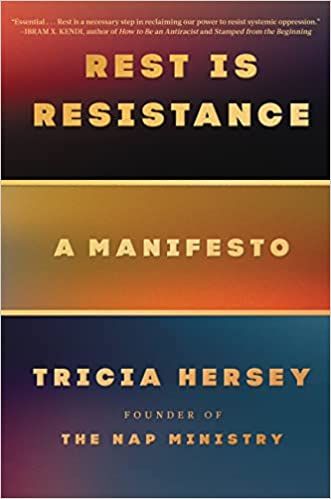
Rest Is Resistance: A Manifesto by Tricia Hersey
At first glance, this may not seem like an obvious book to reach for to combat the Almond Mom or body-shaming, but our culture is tied to our worth equaling our productivity. Since thin people are, by and large, seen as “worth more,” they can be seen as more productive, more helpful to society. By dismantling our internal beliefs that we are only what we produce, we can also break those ties between productivity and fatphobia. Hersey also discusses how rest can be a movement of resistance to all forms of the capitalism machine that keeps all of us, particularly people of color, believing that our bodies are only worth what we can produce.
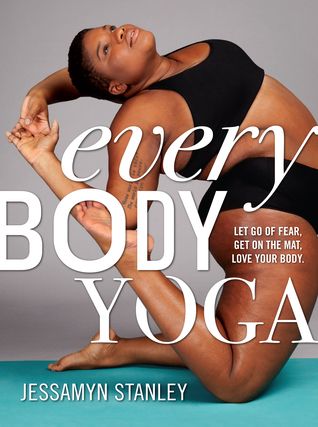
Every Body Yoga: Let Go of Fear. Get on the Mat. Love Your Body. by Jessamyn Stanley
Inclusive discussions and spaces for fat people don’t just include food-focused things: that also includes movement and exercise. Jessamyn Stanley is an award-winning yoga teacher who is determined to show that every body is a yoga body. Not only is it full of color photos and instructions for every level of yogi — beginner to experienced — to follow, it also includes messages that reaffirm that yoga is about how your body feels, not looks.
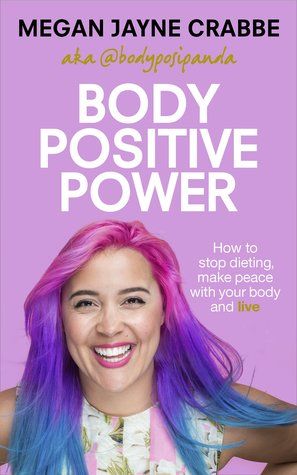
Body Positive Power: How Learning to Love Yourself Will Save Your Life by Megan Jayne Crabbe
Megan Jayne Crabbe is most well-known for her large Instagram following, where she posts fun, rainbow-colored content on loving your body as-is, including rolls, cellulite, natural body hair, and more. She herself grew up in diet culture, going through the same cycle as many people, until she was able break free. Now, she spends her time educating others about the harm diet culture can do and why it’s important to treat our bodies with care and respect.
If you’re ready to dive into even more, check out these romance novels with fat representation on the cover or this amazing personal essay from a Rioter who discusses lies diet books tell. You might also find these books about mindful eating and health at every size useful.
If you need help dealing with an eating disorder, please contact the National Eating Disorder Association by calling 1-800-931-2237.











